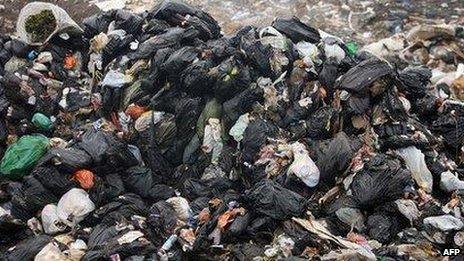NI waste industry: Criminality is widespread says report
- Published

An NIEA spokesperson said plastic bottles, bin bags, food and wood have been found at the Campsie site. Construction site material has also been found
Criminality is widespread in the waste industry in Northern Ireland with at least some involvement by organised crime, a report has found.
Vast profits can be made by the criminals with very little deterrent, according to the independent report for the Department of Environment.
It was commissioned after a huge illegal dump was found near Londonderry in June.
It also discovered that 20 other sites have been investigated.
The report estimates that cleaning up illegal dumps, which have already been discovered, could cost £250m.
An officer of the NI Environment Agency's (NIEA) environmental crime unit had strong suspicions about the Derry site at Mobuoy as far back as 2007, but it took another five years before action was taken.
Environment Minister Mark H Durkan said there would be fundamental change in how waste is managed in Northern Ireland.
Organised crime
The report recommends that the entire waste system must be looked at to see how criminals exploit it, and regulation should be more rigorous and robust.
The review was commissioned in June by Mr Durkan's predecessor Alex Attwood, after the NIEA discovered 516,000 tonnes of waste near the River Faughan in Mobuoy.
The waste was deposited in and around a licensed recycling facility owned and run by City & Industrial Waste Ltd, with the majority of the waste being buried in sand and gravel pits.
The licence of City and Industrial Waste Ltd was revoked, and at the time the company denied any wrongdoing.
The report, by former Welsh Environment Agency director Chris Mills, said it is not known who deposited this waste; however, this was a sophisticated operation that had been carried out over a number of years.
The report also found the scale of the dumping at the Mobuoy site was "on a scale not previously encountered".
The report's findings, external include:
Criminality is widespread in the waste industry in Northern Ireland, with at least some involvement by organised crime
The Fit and Proper Person Test is not sufficiently robust to screen out criminals, thus allowing them the opportunity to obtain a licence or permit to run a waste facility
The deficiencies in the Waste Carrier Registration System and the inability of the regulator to track waste flows with any accuracy makes it easy to move waste around, including in and out of licensed facilities, and to conceal where the waste finally ends up
The ability to dig sand and gravel pits without first obtaining planning permission means a ready supply of ideal sites for the illegal disposal of waste
If illegal dumping is discovered and the perpetrators are caught, the current sentencing regime provides very little deterrent
Even if the Proceeds of Crime Act can be used to increase the financial penalties, vast profits can still be made
The regulatory regime for waste has become very complicated, and much of it is not working as intended.
'Sober reading'
It estimated that at least £34.6m was evaded in tax through the illegal dumping at the site.
The report said it was not possible to confirm who carried out the illegal dumping, and a criminal investigation was ongoing.
It said similar patterns of organised crime involvement were happening in England and Scotland, as were legal waste management sites being used as a cover for illegal activity.
Mr Durkan said the report "makes for sober reading", and implementing the recommended changes must be "done in a powerful way that creates and delivers fundamental change".
"I have directed the new chief executive of the NIEA to urgently prepare a robust range of actions for my consideration," he added.
"I will issue my response to the Mills report in the new year so that everyone is clear about the actions that will be taken to fix the problems that Mr Mills has identified."
Terry A'Hearn from the NIEA said: "The sharing of information internally needs to improve.
"The investigation is still live. This is a sophisticated operation so the people who have done this have left things difficult to trace.
"The waste is on location and may take several years for it to be properly removed. We are now engaging with top-class experts to organise the clean-up.
"There have been two arrests to date in relation to the Campsie site. We hope more are made. There is no suggestion at this stage that there is a cross-border element."